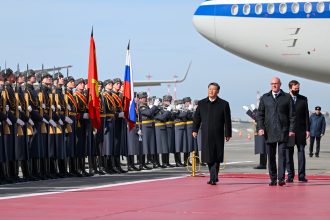CAIRO: Human Rights defender Negad Al-Borai slammed what he described as maneuverings by the government to propose a bill regulating civil society organizations, adding that several parties were also in favor of such a proposal and not just the current Cabinet.
“This discussion isn’t new,” said Al-Borai, remarking that it went as far back as 1990. “The process changed from a discussion of activity to a discussion of funds,” he said.
This bill, which Al-Borai claimed was to be presented under the Essam Sharaf cabinet and currently by El-Ganzoury’s government, was originally proposed to Mubarak’s former minister of social solidarity Ali Moselhi, “which even he refused to present to the NDP-controlled parliament.”
Al-Borai said that before 2011, there used to be a regime-hierarchy so that it would be easily discernible who was responsible for restricting or clamping organizations. “Now they’re all on the same level. All of them want to restrict.”
He identified those interested in cracking down on NGOs as the Supreme Council of the Armed Forces, to clamp on reporting security brutality, International Cooperation Minister Fayza Aboul Naga, so that government would oversee the funding of NGOs, and the current parliament, to quell future talks about human rights and violations.
“Formerly [we believed] it was only security apparatus that wanted to crack down on NGOs, but now it appears others want to too,” Al-Borai said.
His comments came over the course of a debate hosted by the Cairo Institute for Human Rights Studies (CIHRS), which included Tunisian lawyer and human rights worker Abdel-Sattar Ben Moussa, and CIHRS’ Director of Research Essam-El-Din Hassan, in which they compared between the situations of NGOs in Egypt and Tunisia before and after their uprisings.
Al-Borai said that the Egyptian government acted as if the civil society was composed of “a bunch of traitors who do anything for money,” and that the best option to deal with them was to observe and pursue them.
He also said that others in parliament believed that the civil society was immature and likened to children, who should be protected from themselves, by clamping their sources of income so they wouldn’t act badly.
“The same idea was raised for the media,” Al-Borai said, where the parliament proposed creating a committee that censors the media, “so it doesn’t make mistakes.”
For the Tunisian perspective, Ben Moussa remarked that “the current miserable conditions” in Egypt were also experienced there before 2011. “Not only that, but we suffered from worse under the minister of interior, which held all the powers currently held by the Egyptian minister for social solidarity.”
By law in Egypt, the minister for social solidarity is currently entitled to shut down any civil society entity at will.
Ben Moussa showcased the especially stark contrasts between the current situation in Tunisia and Egypt, which the new civil society law affirmed.
According to Tunisia’s law, NGOs can be formed by a minimum of two people, and are free from supervision and activity-censorship restrictions, operating on the principle of transparency.
Additionally, the Tunisian government is obligated to protect the civil society as “partners in the establishment of the values of democracy and the respect for human rights in the transition period.”
Hassan meanwhile said that there is an ever greater need at the moment for a democratically adopted law, but forecasted such a happening as unlikely, “as over 70 percent of the current parliament is with this attack or even part of it.”
He said that they were against any form of adding any human rights, or freedom-related, or even ‘civil-state’ minded issues. “Many Islamic forces are attacking the idea of having NGOs with western funding, thus the attack is even broader and more vicious than under Mubarak.”
Hassan then presented a counter-proposal sponsored by over 35 NGOs, drafted over a period of two years, by organizations such as the Egyptian Organization for Human Rights, CIHRS, and Al-Borai’s United Group, along with former judge Hesham Al-Bastawisi, which shows parallels to the current Tunisian law.
Such features included optional registration for NGOs (whereas it is currently mandatory), reducing the number of founders to two persons as in Tunisia, and moved the authority of jurisdiction to the Ministry of Justice rather than the Ministry of Social Solidarity.
The panel agreed generally on the principle that the civil society had to “fuse with the community,” which Ben Moussa and Al-Borai particularly thought was essential.
“Those interested in the civil society should understand that they’re coming to a new era with new rules. And the road is to fulfill the demands of the masses; if they want a hospital, build one,” Al-Borai said.
He noted that the civil society neglected the public’s traditional distrust of the west and apathy towards human rights issues, and rather concentrated on the downfall of Mubarak and the regime’s corruption, believing that with their downfall there would be the inevitable rise of reform.
When Mubarak was gone, “their [raison d’être] disappeared, Al-Borai said. “We have to forget the old civil society, and see how we’re going to construct a new one that is from the people for the people, that will fulfill their demands.”
Al-Borai even expressed partial regret at the efforts he made. “Maybe if I received the funds and distributed them to the poor, or built a mosque with them, things could have been better.”
He noted that NGOs activities in poor societies won’t be popular “unless [people] see the results with their own eyes.”

